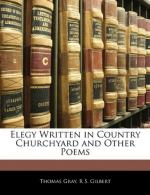|
This section contains 1,066 words (approx. 3 pages at 400 words per page) |

|
Death
Gray's "Elegy" is one of the best-known poems about death in all of European literature. The poem presents the reflections of an observer who, passing by a churchyard that is out in the country, stops for a moment to think about the significance of the strangers buried there. Scholars of medieval times sometimes kept human skulls on their desktops, to keep themselves conscious of the fact that someday they, like the skulls' former occupants, would die: from this practice we get the phrase memento mori, which we say to this day to describe any token one uses to keep one's mortality in mind. In this poem, the graveyard acts as a memento mori, reminding the narrator to not place too much value on this life because someday he too will be dead and buried. The speaker of the poem is surrounded by the idea of death, and throughout...
|
This section contains 1,066 words (approx. 3 pages at 400 words per page) |

|




